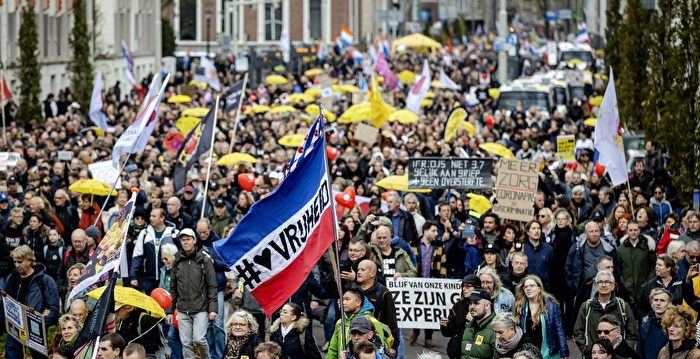[Epoch Times November 16, 2021](The Epoch Times reporter Anqing Holland reported) The epidemic in the Netherlands has rebounded strongly recently. The government is considering whether to further implement stricter “virus permit” regulations. At the same time, protests continued in various places, and all sectors of society expressed their doubts about the vaccination regulations.
At present, the Dutch government implements a 3G “virus pass” system, that is, people who have been fully vaccinated or recovered from a virus infection, and those who have a negative virus test within 24 hours can obtain a QR code as a “virus pass”. The 2G system excludes those who test negative for the virus, which means that those who do not get vaccinated will be more restricted.
People continue to protest against divided society
Regarding this regulation, the Dutch generally believe that vaccinations should not be forced, nor should people be forced to produce this certificate. In many cities, there have been cases in which industries such as the catering and hotel industries did not strictly check the QR codes of customers or even refused to check. At present, Dutch law does not allow employers to force employees to share vaccine records.
Recently, protests against epidemic prevention measures and QR codes have been held in various parts of the Netherlands. On October 3, the demonstration in Amsterdam attracted approximately 25,000 people. On November 7, about 20,000 demonstrators gathered in The Hague.
The demonstrators in The Hague carried a banner “I fight for freedom #KlaarmetRutte”. They made it clear that they opposed the use of vaccination certificates and QR codes, believing that this would split society instead of uniting the entire society to fight the epidemic. The other side of the banner reads “Unvaccinated life is also very important.”
Academia: Those who have not been vaccinated may be stigmatized
Not only the public, but also scientists, sociologists and ethicists from all walks of life have been discussing whether it is reasonable to impose additional virus restrictions on 15% of adults who are not fully vaccinated.
Peter Achterberg, professor of sociology at Tilburg University, said that the 2G system may lead to the stigmatization of unvaccinated people.
Anton ten Clooster, assistant professor at Tilburg Catholic Theological Seminary, believes that from a moral point of view, more restrictions may be unfair to people who have not been vaccinated. Kluster said, “The government can require people who have not been vaccinated to be more careful than those who have been vaccinated, for example, to maintain social distancing or use medical masks, and frequently undergo virus tests. They can still enter public places. But if a 2G system is introduced , They don’t have this choice.”
Menno de Jong, a clinical virologist at UMC in Amsterdam and a member of the Dutch epidemic crisis management team, said that although the 2G policy can better protect the unvaccinated population and prevent some transmission, in fact everyone is tested for the virus. The “1G” system works best. “Except for the elderly and vulnerable groups, although the vaccine is effective in preventing serious diseases, it is becoming less effective in terms of immunity and infection prevention, especially for the Delta variant.”
De Jong pointed out that people who are currently spreading the virus in nightclubs and other places are likely to be vaccinated, but they will still infect people who have not been vaccinated. If everyone is tested before entering a nightclub or bar, it can be more effective to prevent it. Cut off the infection channel.
The Dutch government is currently undecided and is expected to make a decision in early December.
Editor in charge: Yu Ping#
.
